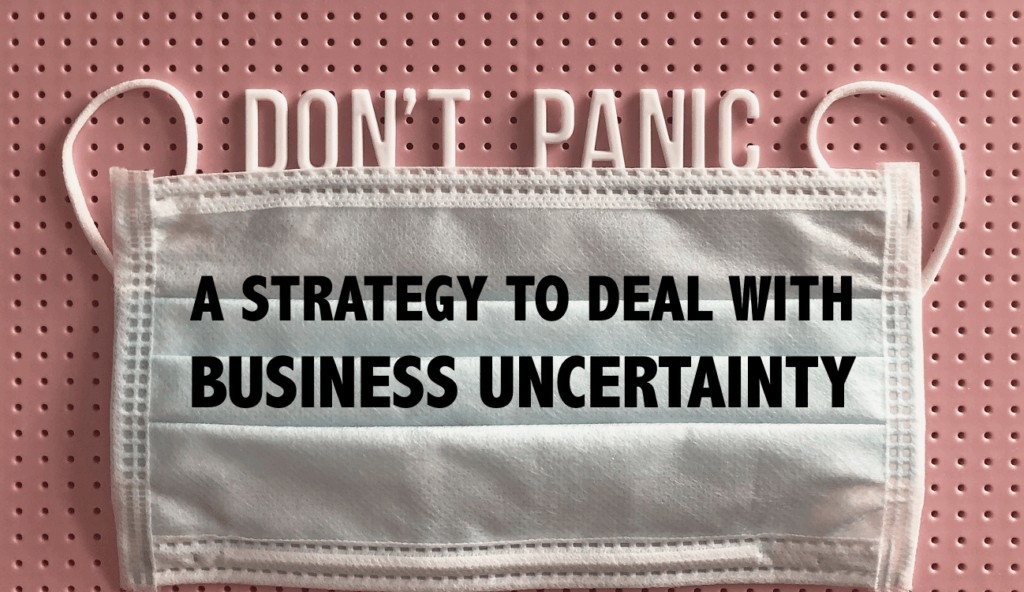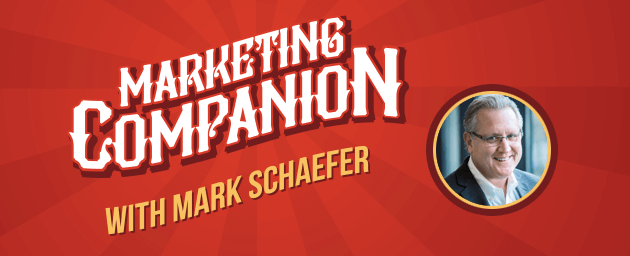Uncertainty can be terrifying. And chronic business uncertainty like we’re experiencing now could have toxic implications for your health, mental well-being, and the ability to make the critical decisions you need to make for your career and your family.
As I compose this post in March of 2020, we are in an unknowable, unprecedented situation. The world that we love will come back from the coronavirus crisis — But when? When do we go back to our lives, our jobs, our friends, our schools? And what about the economy?
I’ve been doing Facebook Live sessions with lessons on “Embracing the Chaos” and have also been posting the videos on my YouTube channel. In my last episode, I covered six practical ideas to deal with uncertainty and put you in the best possible mental state for your life and your business.
1. Be aware of the panic and respond
When we feel anxiety and even panic, your limbic system responds with a knee-jerk fear reaction. This is the same response we have when we jump because we thought a tree root on a forest path was a snake. It’s useful protection for short decisions but toxic if we have to rely on this for days at a time.
People who are good at dealing with uncertainty are wary of the irrational fear that triggers a limbic system response and quell it as it begins to surface. They realize there is no snake in the path.
In this way, they contain a panic response before it spirals out of control.
One of the things that I saw repeatedly in the research about this topic is the therapeutic impact of positive thoughts.
Finding some small thing to stay positive about turns on a different part of your brain. If you stop your brain from being reactive and afraid, you’ll make better decisions.
Positive thoughts quiet fear and irrational thinking.
There is also a lot of research that shows that positivity spreads to other people. So creating positive thoughts in others can suspend that limbic response on a work team.
2. Identify the facts at hand
When uncertainty makes a decision difficult, it’s easy to feel as if everything is uncertain, but that’s hardly ever the case.
People who excel at managing business uncertainty start by taking stock of what they know and what they don’t know and assigning a factor of importance to each.
Dwelling on something impossible — like trying to figure out how long a recession might last — takes away your power to make good decisions.
What are the factors that are unknowable and out of your control? Let them go. Focus on what is certain.
3. Acknowledge that business uncertainty is not a personal failure.
This is a big one for me.
I come from a proud Germanic stock of people who provide and protect.
I realize that could be seen as an old-fashioned notion but hey, centuries of conditioning are hard to un-do. I’d guess that for you, there is probably some little voice inside of you saying “How did I let this happen? Why wasn’t I more prepared?”
Look, I have virtually no business right now and I WAS prepared for something like a recession.
But this level of uncertainty and loss? This is not on me. This is not my fault. And just saying that out loud is empowering … and true.
I have to live in the real world, not be wedded to some historic sense of responsibility right now.
Don’t be afraid to exert self-compassion and say, “Here’s what we don’t know, but we’re going forward based on what we do know. We may make mistakes, but that’s a lot better than standing still.”
The only thing we control in an uncertain world is our response and the decisions we make.
4. Focus on three known priorities
When I worked in the corporate world, I used to collaborate with a quality control executive. And he was obsessive about getting people to focus on “The Big Three.” Over and over, he would challenge his colleagues to see if they were focused on the three most important things to their role in the business.
Not four. Not 25. Three.
One of my customers sent me a message last week. He said, “Right now in this crisis, I am focusing on conserving cash, responding to customer’s immediate needs, and taking care of my people.”
Those certainly are three critical goals, and the right ones, no matter what uncertainty there is in the world.
How about you? What are your Big Three?
Is it keeping your children comforted and sane in a lock-down? Exploring new business strategies? Committing to a period of wellness and new habits?
Pick three. Focus like a laser. The uncertainty will fade away.
This is liberating because if you try to respond to every distraction you’ll be completely sapped of energy.
By the way, I’m convinced this is a solid business practice at any time. Every decision contains at least a small factor of uncertainty. So focus on the three priorities you can control.
5. Focus on positive actions – even if they are imperfect
Where you focus your attention determines your emotional state. When you fixate on the problems that you’re facing, you create and prolong negative emotions and stress, which hinders performance.
When you focus on actions, you create a sense of personal efficacy that produces positive emotions and improves mental performance.
In the early days of this crisis, I wrote about how I felt disoriented.
Whether I’m writing a blog post, giving a speech, developing a strategy, or writing a book, I’m a teacher. That’s my purpose. And then BOOM! The teaching stopped. All of it.
I spent a few days in a funk trying to determine a new normal. What is my place in this crisis? What is my purpose?
And then it dawned on me that I’m still a teacher. I just need to teach something new.
I can take action to deeply connect to people where they are right now. I can’t be on a stage talking about the Marketing Rebellion, but I can teach through a blog post. I can teach through live streaming and videos. I can help people through personal phone calls.
I didn’t follow a plan, because there is no plan for this. I trusted my gut.
By immediately focusing on positive action — even if it was imperfect — I felt like I had some structure in a universe of business uncertainty.
I have not even tried to be perfect. My videos are so plain, and I even had a minor audio problem with a live-stream. But, I showed up. I applied my skills to the situation at hand.
A friend sent me this message after my last video session:
“My personal life has crashed. My business has crashed. My investments have crashed. And I’m in isolation and running out of bourbon. But your words of encouragement on your video saved my day. Never underestimate your impact, sir.”
Yeah. I’m still a teacher dammit.
Taking positive action, even when you’re winging it — and we’re all winging it — provides footing in an uncertain time.
6. Stop asking “What if?”
“What if?” statements throw fuel on the fire of stress and worry, and there’s no place for them in your thinking once you’re focused on the Big Three and your plan.
The what ifs will answer themselves. You can’t change that. You can’t dwell on the unknown and business uncertainty or you’ll go nuts.
Every now and then my mind wanders back to “what if” because I’m a planner. But every time my mind goes there I feel stressed, so it has to stop!
The virus is not in your control. Unemployment is not in your control. The economy is not in your control.
What’s in your control are the decisions you make and taking positive actions on those decisions.
Does this help?
 Mark Schaefer is the chief blogger for this site, executive director of Schaefer Marketing Solutions, and the author of several best-selling digital marketing books. He is an acclaimed keynote speaker, college educator, and business consultant. The Marketing Companion podcast is among the top business podcasts in the world. Contact Mark to have him speak to your company event or conference soon.
Mark Schaefer is the chief blogger for this site, executive director of Schaefer Marketing Solutions, and the author of several best-selling digital marketing books. He is an acclaimed keynote speaker, college educator, and business consultant. The Marketing Companion podcast is among the top business podcasts in the world. Contact Mark to have him speak to your company event or conference soon.



